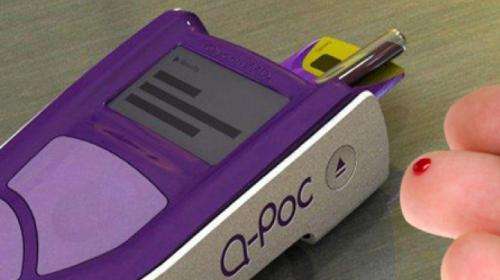Nanomal smartphone-like malaria detection device to be field tested one year earlier than scheduled

A pioneering mobile device using cutting-edge nanotechnology to rapidly detect malaria infection and drug resistance will be ready for field testing this year, one year ahead of schedule.
The €5.2million (£4million) Nanomal project was launched last year to provide an affordable hand-held diagnostic device to detect malaria infection and parasites' drug resistance in 15 minutes. It will allow healthcare workers in remote rural areas to deliver effective drug treatments to counter resistance more quickly, potentially saving lives.
The news that the project is a year ahead of schedule comes on World Malaria Day today (25 April), as the World Health Organization warns of the alarming growth of resistance to drug treatments.
Nanomal lead Professor Sanjeev Krishna, from St George's, said: "Recent research suggests there's a real danger that current artemisinin combination therapies could eventually become obsolete, in the same way as other anti-malarials. This risk is worsened when patients presenting with a fever are given anti-malarial drugs without an analysis of the malaria parasites' drug resistance status, or even without a diagnostic test at all, thereby reducing the treatments' effectiveness."
The Nanomal device is being developed by St George's, University of London and Newcastle-based QuantuMDx Group. It will use a range of novel nanotechnologies to rapidly analyse the malarial DNA from a finger-prick of blood. The sample will be processed and a nanowire biosensor will detect DNA sequences of interest. This will provide a malaria diagnosis, speciation and drug resistance information in 15 minutes, allowing an effective personalised drug combination to be given immediately. The smartphone-like device will be easy to use; a healthcare worker simply puts the sample into the device, presses a few buttons and waits for the result, making it ideal for use in the field.
QuantuMDx's CEO Elaine Warburton said: "Placing a full malaria screen with drug resistance status in the palm of a health professional's hand will allow instant prescribing of the most effective anti-malaria medication for that patient. Nanomal's rapid, low-cost test will further support the global health challenge to eradicate malaria."
The device aims to provide the same quality of result as a referral laboratory, at a fraction of the time and cost. Each device could cost about the price of a smartphone initially, but may be distributed free in developing countries. A single-test cartridge will be around $13 (£10) initially, but the goal is to reduce this cost to ensure affordability in resource-limited settings.
In addition to improving immediate patient outcomes, the project will allow the researchers to build a better picture of levels of drug resistance in stricken areas. It will also give them information on population impacts of anti-malarial interventions. The technology could also be adapted afterwards for use with other infectious diseases.
















